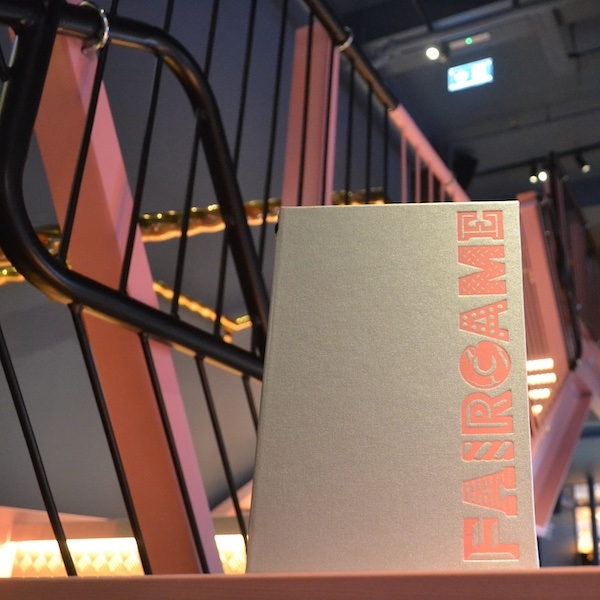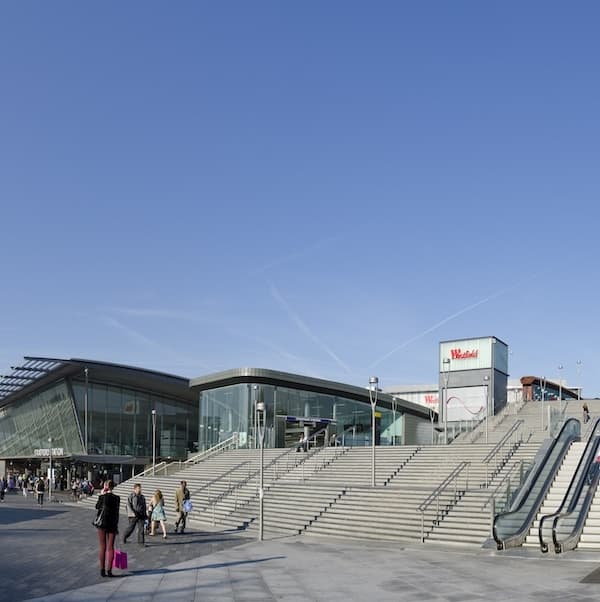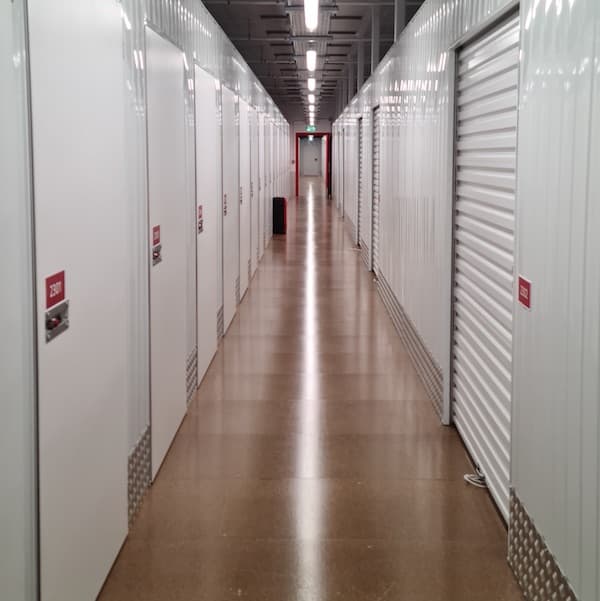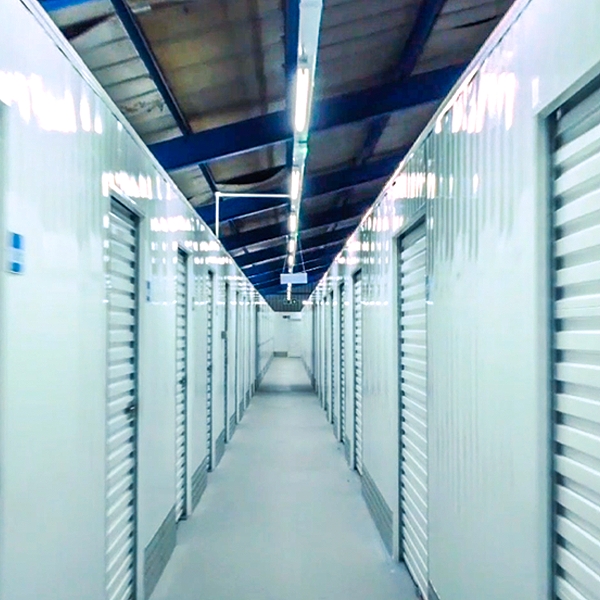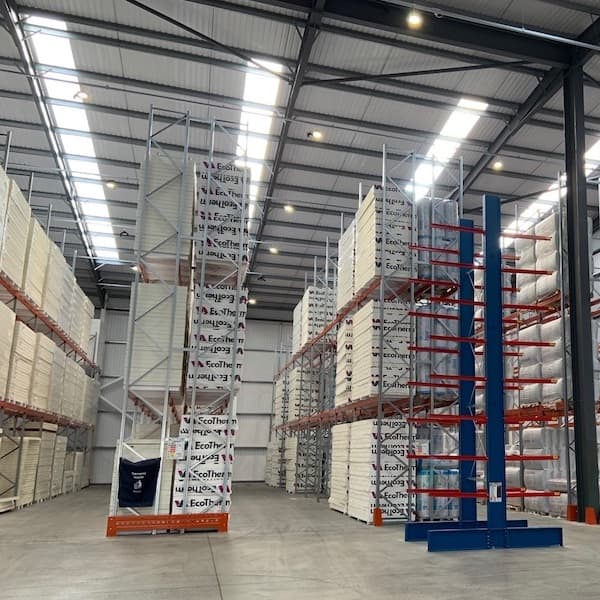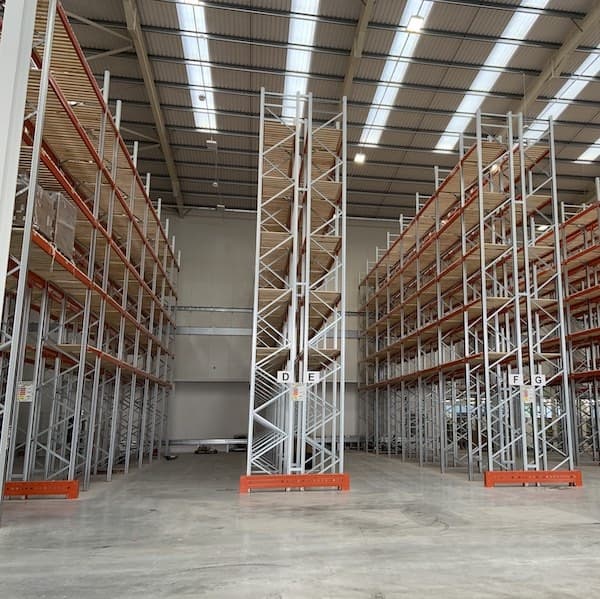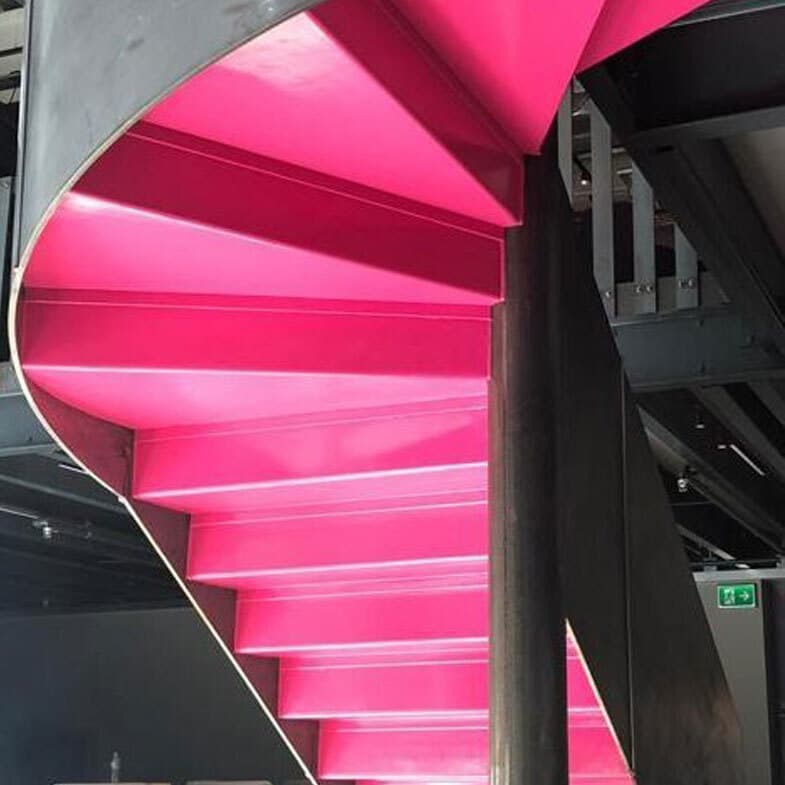- Mezzanine Floors
- Solutions
- Multi-Tier Mezzanines
- Mezzanine Pallet Safety Gates
- Mezzanine Staircases
- Mezzanine Handrails and Balustrades
- Mezzanine Decking
- Fire Protection for Mezzanine Floors
- Mezzanine Lift Shaft Design and Installation
- Resources
- Mezzanine Floor Calculator
- Mezzanine Floor Regulations and Building Control
- Self-Storage Mezzanine Floors
- Self-Storage Units
- Resources
- Self-Storage Site Selection Information
- Calculating The ROI of Self-Storage Conversions
- Planning for Automation in Self Storage
- Racking & Shelving
- Solutions
- Cantilever Racking
- Pallet Racking
- Coil Racking
- Longspan Shelving
- Tyre Racking
- Kimer Racking
- Live Storage Racking
- Drive In & Drive Through Racking
- Clip Shelving
- Mobile Shelving
- Custom Fabrications
- About Us
- USS Case Studies
- Self-Storage Fit-out For Raked Ceiling Building
- Mezzanine And Staircases For Entertainment Venue
- New Mezzanine And Staircases For Major Retailer
- Mezzanine Pallet Safety Gate
- Self-Storage Fit-Out Project For Brand New Facility
- Warehouse Racking, Wire Mesh & Shelving for New Warehouse
- Self-Storage Partition System & Components Installation
- Self-Storage Store Mezzanine And Staircases
- Multi-Tier Mezzanine For Logistics & Distribution Facility
- Warehouse Plant Platform
- Self-Storage Facility Space Expansion
- Mezzanine Floor For Distribution Warehouse
- Bespoke Feature Staircase & Mezzanine
- Single Level, Multi-Use Mezzanine
- Mezzanine For A New Building
- Mezzanine Floor For Plumbing Supplies Warehouse
- New Racking System and Mezzanine Floor
- Car Park Conversion To Self Storage Facility
- Pallet Racking and Cantilever Racking For Warehouse
- Two Mezzanine Floors For Self-Storage Facility In Birmingham
- Our Accreditations
- Contact Us
- USS Case Studies
The Latest Blogs From USS
Common Mezzanine Floor Types. What's The Best Fit For You?
read
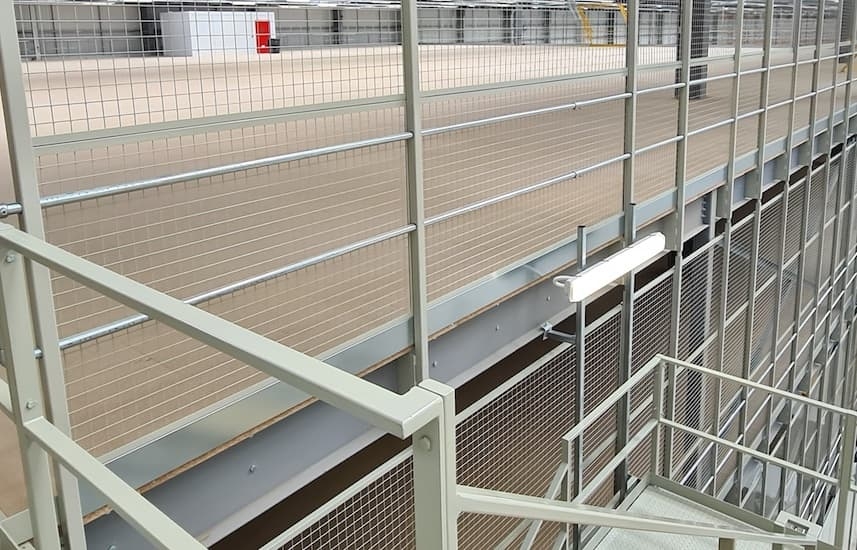
At its very best, a mezzanine floor can make use of otherwise inaccessible parts of a building and vastly increase the space available for a wide range of activities, without increasing the footprint of the building.
In the vast majority of cases, this can be achieved without requiring planning permission. Another advantage is that a mezzanine floor's design can suit a location's specific requirements, including the likely demands, the number of tiers required, and whether accessories such as staircases and handrails are needed.

Here at United Storage Systems, we know all about the different types of mezzanine floor because we've designed, manufactured, and installed a variety for our clients at one time or another. As an experienced mezzanine floor supplier, we've worked with clients to deliver solutions from retail spaces to warehouses, self-storage facilities and distribution hubs. We've helped them take maximum advantage of the vertical space available in an existing building or exploit a new-build's full potential.
When considering the wide range of requirements - and an equally wide range of options to meet those requirements - it's always worth getting help to guide you through the process from initial briefing to complete installation. That way, you'll be fully informed about the best type of mezzanine floor to suit your needs. This article will examine two important aspects of the mezzanine - commonly used decking materials and design options.
Design Options
Once you've chosen the best surface for the mezzanine floor you need, we'll work with you to decide on the design that will work within the space provided. Some of the options are as follows:
Free Standing
Columns support a free-standing mezzanine floor, meaning it is unfixed to the frame of the building. If space allows, possible expansion is one of the advantages of a free-standing structure of this kind. Another advantage is that it is easily relocatable if required. The floor height of a mezzanine from the main floor of a building means the fitting of accessories, such as sprinkler systems, lighting and electrical conduits on the underside of the floor is possible. In this way, the lower areas of, for example, larger warehouse space can be converted into an office/reception type area, while the flooring above creates storage or working space. If the building already has columns or other fixtures in place, the mezzanine floor design can fit around them.
Rack-Supported
A rack supported mezzanine floor solution is suitable where the load-bearing capacity of the flooring itself is as important as having access to a large amount of storage. In essence, shelving racks support the floor, either fully or partially, depending on your mezzanine floor load requirements. The mezzanine floor is secure, and the storage space below is maximised, enabling storage of stock components. The mezzanine floor above can safely bear the weight of further storage racking, office space and other uses such as a manufacturing facility.
Multi-Tier

A single tier of mezzanine flooring can significantly increase and, in some cases, even double the amount of floor space in a building. Multi-tier installation can go one step further. It is possible to add another mezzanine to an existing floor for a multi-tier solution designed from scratch. The design for a multi-tier mezzanine floor will include staircases for access and, in some cases, pallet gates, lifts, chutes and conveyor belts.
Mezzanine Decking Materials
Later, we'll examine the various commonly used settings for mezzanine floors, but it's worth reviewing the types of materials available for the flooring itself. The choice here is based on important factors to ensure the quality and usability of the mezzanine is suitable to its environment and intended purpose.
Bar Grating
Bar grating is a popular choice of material for a mezzanine floor as it guarantees strength and stability. The bar grating floor is robust, and the open nature of the structure allows air and light to pass through, which helps create a much better working environment and lessens the risk of dampness. Another benefit is that water can pass through below if there is a water-sprinkler system installed above.
Wood
A wood mezzanine floor offers an aesthetically pleasing solution and is the perfect choice for any customer-facing business area. It combines aesthetic appeal with warmth and a sense of style and its design can work with a business's branding. Choosing the right kind of high-quality wood for the finish will ensure a hard-wearing mezzanine floor that is easy to install and keep clean once it's in use.
Steel Diamond Plate
Diamond or chequer plate steel is particularly suited to areas where the traffic is constant and heavy. The decking is usually 6mm steel sitting on a steel structure, giving it great strength and durability. The diamond pattern on the steel plates lends slip and skid resistance to the floor surface. As well as being perfect for heavy traffic areas, steel diamond plates can support large storage racks or heavy equipment.
Concrete
In many cases, a mezzanine floor installation is not permanently attached to the main structure of the building. However, a concrete floor may be a good option for permanent installations to cope with weighty loads, forklifts, and footfall traffic. As well as providing maximum strength and durability, a concrete floor will cope easily with a wet or humid environment making it an ideal choice for multi-purpose operations.
Particle Board
Made from fine timber bonded with resin, 38mm particle board is versatile and offers a pleasing appearance similar to wood, combined with the capacity to cope with heavy loads. Compared to other types of decking, particle board is highly cost-effective and can feature moisture-resistant and/or slip-resistant benefits.
Mezzanine Floors Work for All kinds of Spaces
The basic mechanics of designing a mezzanine floor will remain pretty constant no matter what type of business is involved. Nevertheless it's crucial to gather information beforehand, such as establishing the floors' load(s), discovering the expected range of uses of the mezzanine floor and the number of people likely to access it. The latter is significant when dealing with fire regulations' health and safety issues and exactly how much protection the mezzanine floor will need.

The following are some of the operational areas where a mezzanine floor might be the ideal solution.
Industrial
A mezzanine floor for an industrial setting can have flooring manufactured from concrete or steel plating and a steel structure. Particle board is also a popular choice for a more cost-effective solution. As well as storage, a mezzanine floor in an industrial setting may be used to produce and assemble components, with the shop floor underneath reconfigured for other uses.
Warehouse
Warehousing is one of the sectors most likely to use mezzanine flooring. The reasons are simple – a mezzanine has the potential for a warehouse to double the storage space available without investing in new building work. Once the installers have fitted the mezzanine in a warehouse, they can, if required, include shelving or racking. Furthermore, removing sections of the mezzanine floor is possible if demand dips at any time or if the business model changes.
Office Space
 The initial constructions of many industrial units often concentrate on the primary use and neglect to create a suitable space for paperwork, administration, meeting with clients, and so on. In some cases, the area may be so restricted that workers must handle office functions in a separate building which is far from ideal. Management may require quick and simple access to the shop floor while dealing with administrative matters. A mezzanine with dedicated office space provides the perfect means of separating the shop floor from the back of house functions without impacting ease of access.
The initial constructions of many industrial units often concentrate on the primary use and neglect to create a suitable space for paperwork, administration, meeting with clients, and so on. In some cases, the area may be so restricted that workers must handle office functions in a separate building which is far from ideal. Management may require quick and simple access to the shop floor while dealing with administrative matters. A mezzanine with dedicated office space provides the perfect means of separating the shop floor from the back of house functions without impacting ease of access. Retail
Mezzanine floors are often called for when designing a new-build retail space such as supermarkets or department stores. They offer the flexibility needed when the shape, type and amount of display space required are likely to fluctuate. Through the use of accessories, the floor's design can support the retail branding. Retail mezzanine floors can act as semi-permanent, higher-level floors. A staircase, lift or escalator can access them.
This blog is for information purposes only and should not be construed as legal or financial advice and not intended to be substituted as legal or financial advice.
Find Us
S & L United Storage Systems Ltd
United House, The Street
Takeley, Bishop's Stortford
Hertfordshire, CM22 6QR
Company No. 1313816
VAT No. 291616253Say Hello
01279 871 787Copyright © 2025 S & L United Storage Systems Ltd. All rights reserved.
- About Us
